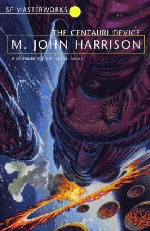
The Centauri Device
M. John Harrison
205 pages
published in 1975
M. John Harrison is a British science fiction writer, who was first published in New Worlds in 1968. He continued to write stories, as well as criticism for it for several years and he also served a stint as New Worlds literary editor. He seems to have had more critical than commercial success, though the publication of his 2002 novel Light seems to have changed that.
It was in fact the publication of this novel that made me notice him. I had heard of him before, read a few of his short stories and even owned (but had not read) his first novel, The Committed Men. The buzz around Light, as well as that people were comparing China Miéville, one of my favourite writers, with Harrison, let me to take a closer look at him. I started with The Centauri Device, his third novel, for no deeper reason than that the cover, a typical mid-seventies Chris Fossian space battle, appealed to me.
Of course, you should never judge a book by its cover, as I soon found out. This is not, as the backcover tries to pretend, a happy little space opera. The Centauri Device starts out bleak and ends even bleaker. In essence, this is an exercise in nihilism.
The plot of The Centauri Device revolves around John Truck, just another spaceways loser, barely able to keep his junk freighter going, slowly going down the drain just like every other space loser. But he has a secret he doesn't known himself: he is the last living Centauri, the sole descendant of a race genocided by Earth. And now he is the only person who could handle the mysterious device found on Centauri VII, which might be the key to end the cold war between the IWG, the Israeli World Government and the UASR, the United Arabic Socialist Republic. John Truck wants nothing to do with either of them, or with the Openers, the third party chasing the Device, who believe that honesty of bodily function is the sole valid praise of god and so open up their stomachs, putting in plastic viewing ports. As I hinted at before, this is not a story with a happy ending. At every turn in the plot, things end up worse for Truck until he is forced to make the one decision he did not want to make: to use the Device.
The writing in The Centauri Device is very effective. Harrison doesn't drench you into squalor like Miéville does, but the anti-septic, clean way in which he describes things seeps into your bones. The secenery is one of urban decay, whether it is on the seedy port cities on alien planets or the future England Harrison depicts, one which is one great decaying dockyard, after an economic crash took away all the jobs. The politics are dreary, with both the IWG and UASR agents Truck encounters mouthing platitudes about their side which they themselves never believed. Religion fares no better; the openers being not the most attractive fictive religion I've ever encountered. Even hedonism is shown as empty; when Truck gatecrashes the Universe Longest Running Party, it promptly ends.
In the end you can clearly see that The Centauri Device is a child of its time. The universe in it is a far future mirror of 1975 England, with all the bleakest parts exaggerated and any optimism sucked out of it. It is the mirror image of conventional space opera: the loser who turned out to have the key to the universe stays nothing more than a pawn in a repulsive political game between superpowers with little imagination and he does not rise above his circumstances. Instead, the best thing he can do is to blow the whole thing up.
And so The Centauri Device is perhaps the perfect example of the central message of the British arm of the New Wave, who at the time where only the latest writers in a long British tradition to take this up, that entropy is a given, the universe and the world will run down and things will never get better. It's a bleak message, a message you would like to deny, but you cannot.
